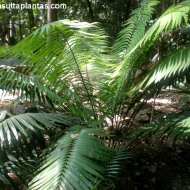Care of the cycad Dioon merolae or Spiny palm |
|
The genus Dioon, family Zamiaceae, includes 14 species of cycads native to Central America. Some species are: Dioon merolae, Dioon mejiae, Dioon edule, Dioon spinulosum. Common name: Spiny palm (from spanish "Palma espinuda"). This species is native to Chiapas and Oaxaca, Mexico. They are slow-growing dioecious cycads with an erect (sometimes creeping) stem that can reach 4 meters (13.12 feet) in height. The long leaves up to 1 meter (3.28 feet) in length have dark green, linear-lanceolate leaflets. The female cones, gray in color, are egg-shaped and reach 35 cm (13.77") in height; male cones, light brown in color, are 40 cm (15.74") tall. Spiny palm is used in rockeries, borders, as isolated specimens and in pots for patios and terraces. It's ideal for coastal gardens due to its resistance to salinity. Dioon merolae grows in full sun, semi-shade and shade exposures; in regions with a Mediterranean climate it is better to grow them in semi-shade. Frost resistant to -5 ºC (23 ºF). The soil can be a normal well-drained garden soil with coarse sand and containing abundant organic matter; it also grow in poor soil. Water regularly so that the substrate never dries up completely (never flood). Reduce watering in winter. Adult plants already established resist a few days of drought. Fertilize with compost or humus at the end of winter. Prune dry leaves in autumn. Dioon merolae is a plant resistant to the usual pests and diseases. Spiny palm is propagated by separating suckers and from seeds sown in spring. |
Images of the cycad Dioon merolae or Spiny palm |
Find plants
Dioon merolae or Spiny palm | Care and Growing
© 2025 FavThemes
